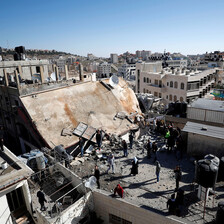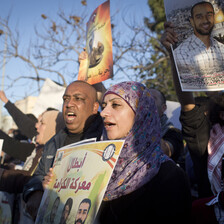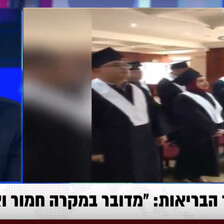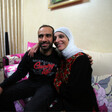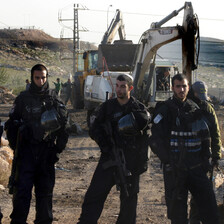The Electronic Intifada Jerusalem 18 December 2014
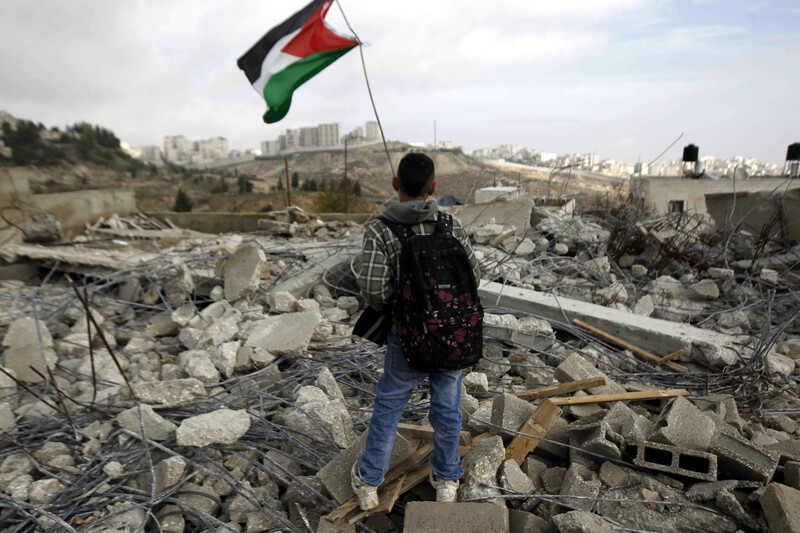
A Palestinian youth stands on the rubble of his family’s home demolished by Israeli authorities in Issawiyeh on 1 December.
APA imagesWalking the streets of Issawiyeh in occupied East Jerusalem, one could easily think that Israel has succeeded in normalizing a very abnormal situation.
The process of colonization affecting the village has been so relentless that Palestinians living here say “we have gotten used to it.”
Youths in Issawiyeh nonetheless keep fighting back — usually with rocks and fireworks — against Israel’s brutal behavior. This year, the spirit of resistance has been especially strong.
Spontaneous rebellions occurred after the murder of Palestinian teenager Muhammad Abu Khudair in early July and during Israel’s 51-day offensive against Gaza, which began less than a week later.
Many of those taking part were radicalized in early 2013, when the people of Issawiyeh mobilized in support of local man Samer Issawi, who undertook an historic hunger strike in an Israeli jail.
Israel responded to this year’s protests by firing bullets at rock-throwers. When that didn’t suppress the rebellion, the Israeli military resorted to collective punishment — a practice forbidden by international law — against the entire 20,000 people living in the village.
In late October, the military sealed all but one of the entrances to the village with concrete blocks.
Under siege
The closure created an immense hassle for many residents.
Fadi Atiyeh attends a high school outside Issawiyeh. Because the road from which he usually travels by public transport was shut, it took him one and a half hours to reach school in the morning.
The closure was eventually eased after a few weeks. That measure was taken after local youth decided to block the only entrance to the village that Israel hadn’t closed. That entrance was a point of access for Israelis to Maale Adumim, one of the largest Jewish-only settlements in the occupied West Bank.
Although Israel has no difficulty making life miserable for Palestinians, its forces apparently did not wish to subject Israeli settlers to any inconvenience.
It is important to underscore that the siege of Issawiyeh has not been fully lifted. Israel often blocks the road connecting the village to the adjoining Hebrew University of Jerusalem.
As well as putting the village under siege, Israel attacked villagers with bullets and tear gas grenades. On 6 November, al-Amal, a school for children with special needs in Issawiyeh, was attacked with tear gas, terrorizing the young students.
On 13 November, Israeli police shot eleven-year-old Saleh Samer Attiyeh Mahmoud, permanently blinding him in his left eye. Doctors have been doing what they can to save his right one, which was also seriously injured.
Two different worlds
Issawiyeh and the Mount Scopus campus of the Hebrew University are right beside each other; yet, in some respects, they are two different worlds.
On 16 November, as I was attending an international humanitarian law class, I overheard an American exchange student joking about “sound effects” when the noise of Israeli gunfire could be heard coming from Issawiyeh.
Although the violence was just a ten minutes’ walk away from where he was sitting — and involved breaches of the international law he was learning about — he and many other students have been able to keep on going to class, treating the nearby unrest as little more than background noise.
Salam Muhaisen does not have that luxury. Each morning during the closure, she walked from her native Issawiyeh to the Hebrew University, where she is a student of Middle Eastern and Islamic studies.
“On the way I smell skunk water, see the police invade the village and suddenly I’m [at] the Hebrew University where all is perfectly quiet,” she told The Electronic Intifada.
A few Israeli students have bothered to see first-hand what is happening in Issawiyeh; some attended a protest on 12 November. That demonstration was not attacked by Israeli forces — perhaps, according to Muhaisen, because they did not wish to leave a bad impression on the Israeli students.
“Most Hebrew University students believe we are only rioters and trouble-makers who throw rocks for no reason,” Muhaisen said.
“Worse still, some Israeli students here ask me, ‘why don’t you go study in Birzeit [a Palestinian university near Ramallah] or Bethlehem?’ — as if I owe them an explanation for studying in a place built on my own land.”
Muhaisen added, “But obviously all of this adds another incentive for me to study and succeed here; it is my own way of standing up to the racist colonial establishment that takes my rights away.”
Overcrowded ghettos
In October 2013, an Israeli governmental plan to build a nature reserve on Issawiyeh land was put on hold following local and international opposition.
However, earlier this year, Israeli authorities relaunched the plan and designated much of Issawiyeh and its surrounding area, including the lands of nearby villages, as “national park land.” Under that pretext, Israel routinely denies Palestinians permission to build new homes or expand existing ones.
The same restrictions do not apply to Israeli settlements. A large part of Issawiyeh’s land has been expropriated to make way for a “students’ village” — a large compound where dormitories for the Hebrew University will be located. The Israeli settlement of French Hill is also encroaching into Issawiyeh.
The house where Salam Muhaisen and her family live is one of many in Issawiyeh to have been served with a demolition order. Her father has already paid 45,000 shekels ($11,500) to the Israeli-controlled Jerusalem municipality, which complained that the house was built without its approval.
“We are required to contact an architect to draft and propose a plan that would make our home legal,” she said. “We cannot afford to do this as we are a family of seven kids, with two university students. It’s ridiculous that not only have they confiscated our lands, blocked us from harvesting our olive trees and denied us permits to build, they are also requiring us to pay them more money in fines and taxes.”
On 1 December, the Issawiyeh home of Ishaq Hamdan’s family was destroyed for the second time in recent years.
Hamdan was arrested a few months ago over fines and property taxes that the Jerusalem municipality has demanded that he pay. He is serving a one-year prison sentence.
His treatment is doubly cruel, given that his two eldest sons had left higher education so that they could find jobs in order to pay for their home’s construction.
As well as having to pay those bills, Israel is now insisting that the family pays the costs of the demolition.
Muhaisen suggested that Israel’s strategy in blocking access to Issawiyeh was to drive a wedge between different generations of Palestinians. The thinking, she argued, was that older people would blame the stone-throwers for the closure and would therefore put pressure on them to cease their struggle.
If that was Israel’s strategy, then it clearly did not work. The youth of Issawiyeh have continued to grow support from their community.
No matter how hard Israel may try to “normalize” the occupation, there will always be Palestinians determined to resist.
Budour Youssef Hassan is a Palestinian anarchist and law graduate based in occupied Jerusalem. She can be followed on Twitter: @Budour48.
